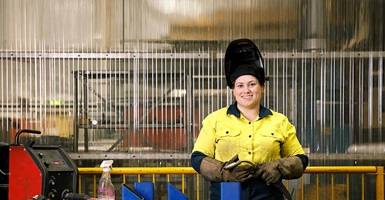The trope of the “starving artist” is common in popular culture – but there are plenty of careers for creative people who want artistic satisfaction while earning a crust.
Michelle Crotty, Manager, Art and Design at Chisholm, says there’s a huge breadth of opportunities for people with visual and creative thinking skills.
Michelle says creative careers can be varied and “don’t always go in a straight line”, so they suit people who are open to different experiences.
Wai Kam Mok, Trainer and Assessor in Building & Construction at Chisholm, says creative professions and courses suit people who are “passionate about learning – and about building both the artistic side and the technical side of their knowledge”.
So how can you turn your creative flair into an interesting and rewarding career? Here are five creative jobs that could be a good match for your skills.
1. Building designer
Building designers play a crucial role in bringing beautiful buildings to life.
As Wai, who teaches the Advanced Diploma of Building Design, explains, building design is “both a technical and a creative vocation”.
“Building designers can create habitable, beautiful environments for people to dwell, function or work in,” says Wai, who is also a registered architect.
“It’s about the study of the human interaction between nature and environments … but there's also a pragmatic side to it, which involves budgets and technicalities.”
As a building designer, you may be involved in the design and sketching of building plans as well as client and project management.
In the Advanced Diploma, students learn crucial drafting and visualisation skills, how to use 3D-modelling software, about building codes and regulatory requirements, as well as how to present work to a client.
Courses to consider
2. Graphic designer
As a graphic designer, you could find work in a design agency, in-house for a company, or strike out on your own as a freelancer.
Michelle says designers need to match their strong visual skills with the ability to think conceptually, research, and follow a creative brief.
For example, students in Chisholm’s Diploma of Graphic Design worked with the Re: program to create a real-world project for the TAC in Victoria. The brief was to design a billboard promoting road safety to young people, which will be displayed in Melbourne’s CBD.
“It's been really interesting watching our students present their concepts to Re:Act for TAC and seeing how they’ve solved the problems they had in the brief,” says Michelle.
“There's a lot of work behind that: a lot of creative and critical thinking and research – so much research to build the knowledge base and inspiration for the concept”
Courses to consider
3. Tattoo artist
Michelle meets many creative students who are interested in pursuing a career in tattoo art.
As a tattoo artist, you can be responsible for turning clients’ concepts into beautiful, permanent body art – so your illustration skills need to be up to scratch!
While you may have to undergo some health and safety training, there’s no specific qualification for becoming a tattoo artist, so Michelle says studying illustration is a great place to start.
“When people want to become a tattoo artist, they often approach tattoo studios who will tell them: go and develop your skills in illustration,” she explains.
Taking a course that advances your illustration skills could help you build the confidence needed to go and find work or an apprenticeship in a tattoo studio.
Courses to consider
4. Animator
As an animator, you could work on big-budget studio features or independent films; you could animate video games; or even find work in web design or advertising.
To make it in animation, it helps to have great attention to detail and an ability to think outside the square.
Michelle says building your knowledge of relevant software is also important – but it’s worth focusing on your artistic foundations first.
“At Chisholm, we had [some visiting artists] who have an animation studio that did a lot of work on The Lego Movie and work with Disney and Pixar,” she says.
“They approached us because they were looking for talent – and they were looking for students who had those fundamental skills: knew colour theory, knew about contrast, knew how to draw with perspective,” she says.
“All these things are not new concepts – they're things artists have been doing since Leonardo.”
Michelle says a visual arts course can give you a good grounding in these concepts, before you specialise in animation.
Courses to consider
5. Multidisciplinary creative
In today’s industry, many employers are looking for people with multiple creative talents, says Michelle.
“The need in industry is not just for photography: now you need to be able to take video; you need to be able to create content; you need to be able to work social media,” she says.
By developing versatile creative skills, you may land a job somewhere you don’t expect.
For example, local councils employ many arts practitioners, galleries need people with visual arts backgrounds, or you could even start your own creative business.
Courses to consider
How to craft a creative career?
Like any career, creative ones require dedication and a desire to keep building your skill set.
Wai says creative courses like building design suit people who want to challenge themselves and be constantly learning.
“As the teacher, I can provide the buffet for you – the techniques and the skills. But it's up to you on what you choose from this to create the meal, or the final product.”
For those just getting started, Michelle suggests taking a course that introduces a broad range of skills and techniques.
“You can't work from the top down – you need to build a really solid foundation,” she says.
“That's all about developing hand skills and then learning software. From there, when you've got those skills in your kit, you're equipped to go anywhere.”
Other courses for creative people
Beyond the art and design realms, there are many other careers that suit creative types.
You may like to channel your creative energy into hairdressing or make-up artistry or even dream up MasterChef-worthy culinary creations in one of these courses:


